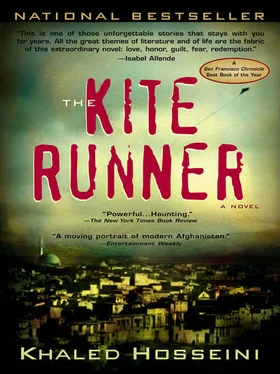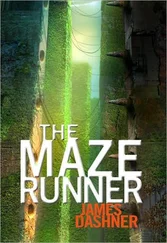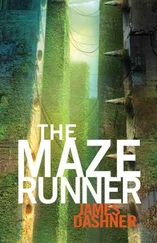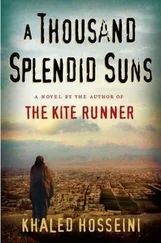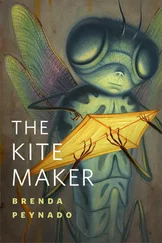I poured him more tea. Rahim Khan talked some more. Much of it I knew already, some not. He told me that, as arranged between Baba and him, he had lived in Baba’s house since 1981 – this I knew about. Baba had “sold” the house to Rahim Khan shortly before he and I fled Kabul. The way Baba had seen it those days, Afghanistan’s troubles were only a temporary interruption of our way of life – the days of parties at the Wazir Akbar Khan house and picnics in Paghman would surely return. So he’d given the house to Rahim Khan to keep watch over until that day.
Rahim Khan told me how, when the Northern Alliance took over Kabul between 1992 and 1996, different factions claimed different parts of Kabul. “If you went from the Shar-e-Nau section to Kerteh-Parwan to buy a carpet, you risked getting shot by a sniper or getting blown up by a rocket – if you got past all the checkpoints, that was. You practically needed a visa to go from one neighborhood to the other. So people just stayed put, prayed the next rocket wouldn’t hit their home.” He told me how people knocked holes in the walls of their homes so they could bypass the dangerous streets and would move down the block from hole to hole. In other parts, people moved about in underground tunnels.
“Why didn’t you leave?” I said.
“Kabul was my home. It still is.” He snickered. “Remember the street that went from your house to the Qishla , the military barracks next to Istiqlal School?”
“Yes.” It was the shortcut to school. I remembered the day Hassan and I crossed it and the soldiers had teased Hassan about his mother. Hassan had cried in the cinema later, and I’d put an arm around him.
“When the Taliban rolled in and kicked the Alliance out of Kabul, I actually danced on that street,” Rahim Khan said. “And, believe me, I wasn’t alone. People were celebrating at Chaman , at Deh-Mazang , greeting the Taliban in the streets, climbing their tanks and posing for pictures with them. People were so tired of the constant fighting, tired of the rockets, the gunfire, the explosions, tired of watching Gulbuddin and his cohorts firing on anything that moved. The Alliance did more damage to Kabul than the Shorawi . They destroyed your father’s orphanage, did you know that?”
“Why?” I said. “Why would they destroy an orphanage?” I remembered sitting behind Baba the day they opened the orphanage. The wind had knocked off his caracul hat and everyone had laughed, then stood and clapped when he’d delivered his speech. And now it was just another pile of rubble. All the money Baba had spent, all those nights he’d sweated over the blueprints, all the visits to the construction site to make sure every brick, every beam, and every block was laid just right…
“Collateral damage,” Rahim Khan said. “You don’t want to know, Amir jan, what it was like sifting through the rubble of that orphanage. There were body parts of children…”
“So when the Taliban came…”
“They were heroes,” Rahim Khan said.
“Peace at last.”
“Yes, hope is a strange thing. Peace at last. But at what price?” A violent coughing fit gripped Rahim Khan and rocked his gaunt body back and forth. When he spat into his handkerchief, it immediately stained red. I thought that was as good a time as any to address the elephant sweating with us in the tiny room.
“How are you?” I asked. “I mean really , how are you?”
“Dying, actually,” he said in a gurgling voice. Another round of coughing. More blood on the handkerchief. He wiped his mouth, blotted his sweaty brow from one wasted temple to the other with his sleeve, and gave me a quick glance. When he nodded, I knew he had read the next question on my face. “Not long,” he breathed.
“How long?”
He shrugged. Coughed again. “I don’t think I’ll see the end of this summer,” he said.
“Let me take you home with me. I can find you a good doctor. They’re coming up with new treatments all the time. There are new drugs and experimental treatments, we could enroll you in one…” I was rambling and I knew it. But it was better than crying, which I was probably going to do anyway.
He let out a chuff of laughter, revealed missing lower incisors. It was the most tired laughter I’d ever heard. “I see America has infused you with the optimism that has made her so great. That’s very good. We’re a melancholic people, we Afghans, aren’t we? Often, we wallow too much in ghamkhori and self-pity. We give in to loss, to suffering, accept it as a fact of life, even see it as necessary. Zendagi migzara , we say, life goes on. But I am not surrendering to fate here, I am being pragmatic. I have seen several good doctors here and they have given the same answer. I trust them and believe them. There is such a thing as God’s will.”
“There is only what you do and what you don’t do,” I said.
Rahim Khan laughed. “You sounded like your father just now. I miss him so much. But it is God’s will, Amir jan. It really is.” He paused. “Besides, there’s another reason I asked you to come here. I wanted to see you before I go, yes, but something else too.”
“Anything.”
“You know all those years I lived in your father’s house after you left?”
“Yes.”
“I wasn’t alone for all of them. Hassan lived there with me.”
“Hassan,” I said. When was the last time I had spoken his name? Those thorny old barbs of guilt bore into me once more, as if speaking his name had broken a spell, set them free to torment me anew. Suddenly the air in Rahim Khan’s little flat was too thick, too hot, too rich with the smell of the street.
“I thought about writing you and telling you before, but I wasn’t sure you wanted to know. Was I wrong?”
The truth was no. The lie was yes. I settled for something in between. “I don’t know.”
He coughed another patch of blood into the handkerchief. When he bent his head to spit, I saw honey-crusted sores on his scalp. “I brought you here because I am going to ask something of you. I’m going to ask you to do something for me. But before I do, I want to tell you about Hassan. Do you understand?”
“Yes,” I murmured.
“I want to tell you about him. I want to tell you everything. You will listen?”
I nodded.
Then Rahim Khan sipped some more tea. Rested his head against the wall and spoke.
There were a lot of reasons why I went to Hazarajat to find Hassan in 1986. The biggest one, Allah forgive me, was that I was lonely. By then, most of my friends and relatives had either been killed or had escaped the country to Pakistan or Iran. I barely knew anyone in Kabul anymore, the city where I had lived my entire life. Everybody had fled. I would take a walk in the Karteh-Parwan section – where the melon vendors used to hang out in the old days, you remember that spot? – and I wouldn’t recognize anyone there. No one to greet, no one to sit down with for chai , no one to share stories with, just Roussi soldiers patrolling the streets. So eventually, I stopped going out to the city. I would spend my days in your father’s house, up in the study, reading your mother’s old books, listening to the news, watching the communist propaganda on television. Then I would pray namaz , cook something, eat, read some more, pray again, and go to bed. I would rise in the morning, pray, do it all over again.
And with my arthritis, it was getting harder for me to maintain the house. My knees and back were always aching – I would get up in the morning and it would take me at least an hour to shake the stiffness from my joints, especially in the wintertime. I did not want to let your father’s house go to rot; we had all had many good times in that house, so many memories, Amir jan. It was not right – your father had designed that house himself; it had meant so much to him, and besides, I had promised him I would care for it when he and you left for Pakistan. Now it was just me and the house and… I did my best. I tried to water the trees every few days, cut the lawn, tend to the flowers, fix things that needed fixing, but, even then, I was not a young man anymore.
Читать дальше
